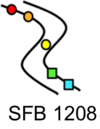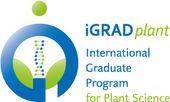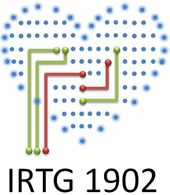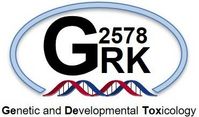Graduate Research Programmes
Heinrich Heine University (HHU) has five faculties which are very strong in research and provide doctoral researchers with an excellent research environment. International and interdisciplinary Research Training Groups (RTGs) and integrated research training groups of Collaborative Research Centres (CRCs) facilitate an successful start to an academic career.
All these coordinated research entities, which adress doctoral and/or postdoctoral researchers at HHU, can become institutional members of Heine Research Academies via a membership in the corresponding faculties' own graduate academies.
HHU structured graduate programmes (Member programs of Heine Research Academies)
Graduate training programs in the Life and Natural Sciences (iGRAD member programs)
Cluster of Excellence on Plant Sciences (CEPLAS)

CEPLAS – Cluster of Excellence on Plant Sciences – from complex traits towards synthetic modules is a joint effort of HHU, University of Cologne, Max Planck Institute for Plant Breeding Research (MPIPZ) and Forschungszentrum Jülich. Researchers of these institutions are pursuing inventive strategies for sustainable plant production. The goal of this cluster initiative is to develop state of the art methods for a second green revolution on the basis of innovative basic research and established know-how in plant research. CEPLAS focuses on cutting edge science as well as on the promotion of young scientists by novel study modules and individual training programmes.
For further information and open positions please see the homepage.
Homepage: CEPLAS

CRC 1116 „Master switches in cardiac ischemia“ - Acute myocardial infarction (AMI) is among the most frequent cardiovascular disorders in the Western world. The Comprehensive Research Center (CRC, SFB) 1116 focuses on the acute and subacute phase post AMI using preclinical approaches in standardized small and large animal models as well as clinical investigations in a multidisciplinary consortium. Aim is the identification of cardiac and systemic effector mechanisms (master switches) in the acute/subacute phase after AMI that determine the morbidity and mortality after AMI and could be used as future therapeutic targets.In the long-term perspective the CRC 1116 aims to identify new targets for improving the prognosis of patients after AMI and to allow stratification of therapeutic strategies. To achieve this long-term goal it will be the focus of the first funding period to identify new master switches mainly in preclinical murine models. Subsequently experiments will be designed to increasingly acknowledge the effect of relevant comorbidities. Large animal models and clinical studies will provide insight into the translational value of the candidate mechanisms and targets. For further Information and open positions please see the Homepage.
Homepage: RTG 1116 - Master switches in cardiac ischemia

Biological membranes maintain a non-equilibrium state between the inside and outside space of single cells, subcellular compartments, and between the cells of multicellular organisms. A prerequisite for life is that membranes are not static entities but comprise constantly changing boundaries that react in response to internal and external cues. How do membranes obtain their identity and control their spatio-temporal dynamics? Which role do their constituents play, mainly the different kinds of membrane proteins and protein complexes? These are the fundamental questions that will be addressed within this CRC. As model systems, we have chosen different uni- and multicellular organisms to investigate identity and dynamics of their membrane systems. Our studies will comprise a two-pronged approach, starting from both, the level of individual membrane proteins and their complexes as well as entire cellular membrane systems.
We combine in our multifaceted consortium a unique range of structural, biochemical and cell biological technologies, which aims to unravel the molecular and cellular processes within the entire biological relevant timescale from nanoseconds to days. Our multidisciplinary approach, which involves extensive collaborations at the methodological and conceptual level, aims to decipher the multidimensional interplay between components of different membrane systems and the membranes themselves that ultimately form the basis for a wealth of biological processes.
For further information see the homepage:
Homepage: CRC 1208

Microbial life has a huge impact on human society determining our health, nutrition and the functioning of whole ecosystems. In nature, microorganisms do not live as autarkic units but interact and communicate with each other resulting in the exchange of nutrients and information, an active process we call “networking”. This microbial networking is operational at different scales ranging from intracellular endosymbionts to intercellular cross-kingdom communities. A highly evolved example of networking is displayed by organelles such as mitochondria and chloroplasts, where endosymbiotic bacterial cells gave up their individuality to become integral, but still semi-autonomous, parts of their eukaryotic hosts. At the community level, higher-order biological entities are formed that consist of prokaryotic and eukaryotic members and are commonly referred to as microbiomes. CRC MibiNet’s vision is to understand microbial networking in its full complexity to explain how organelles evolve and how microbiome functions emerge. Therefore, we address the establishment, maintenance and evolution of microbial networking from intracellular interactions of organelles or endosymbionts and their host cell (A projects) to intercellular interactions in cross-kingdom communities (B projects) using state-of-the-art in vivo approaches and metabolomics (Z projects). We propose that the physiological and metabolic state of each member determines the dynamic and spatial organisation of microbial networking. CRC MibiNet will pursue a profound “learning from nature” strategy: fundamental principles and unifying concepts from natural examples of stable microbial interactions will be challenged by implementing them in the synthetic construction of designer organelles, endosymbionts and cross-kingdom communities. With the interdisciplinary training programme MibiNeⓍt, this CRC puts a special emphasis on the education of the next generation of microbiologists with important skills in data science and modelling enabling them to act at the interface between disciplines. Ultimately, the coordinated effort of CRC MibiNet will open up new horizons for the engineering of microbial networking for future medical, agricultural and biotechnological applications.
More information on the CRC website

Ecosystems are threatened worldwide by anthropogenic degradation, fragmentation and rapid climate change. Plants are critical for nearly all food webs and thus for the functioning of ecosystems. In this CRC, we therefore address the fundamental question: What are the genetic underpinnings of plant responses and adaptation to environmental change? To address this question, we will dissect the genetics of adaptation in plant species with contrasting abilities to grow under limited resources, abiotic stress, and competition with other plants. Using state-of-the-art genetic technologies with a combination of field surveys and controlled environmental manipulations, we will identify the genetic variation that controls survival and reproduction in response to altered resource availability, abiotic stress and plant-plant competition pressures. By comparing closely and distantly related species, we will assess whether the function of genes for adaptation to a particular environmental condition is species-specific or conserved over evolutionary time. For this purpose, our consortium is organized into two key research areas. Research area A will determine the importance of candidate genes and traits for survival and reproduction in challenging environments. Research area B will use quantitative and population genetics methods to isolate the variants in plant genomes that contribute to plant adaptation to natural environments. A common database will assemble all generated results and support the synthesis of findings across plant species, traits, genes, and environments. Our CRC includes an interdisciplinary training program in Molecular Biology and Ecology for early career scientists, who will be crucial for reaching our goals and disseminating our results. Ultimately, work in this consortium will provide key information on the traits, genes and (epi-)genetic variants promoting adaptations to environmental change in plants, and assist future efforts to preserve natural ecosystems.
More information on the TRR 341 website

The International Graduate School for Plant Science is offering an international PhD program with excellent research possibilities for young scientists. iGRAD-Plant is a joint program with the Forschungszentrum Jülich and the Genetics program of the Michigan State University, East Lansing, USA. In order to achieve international research experience all PhD students in the iGRAD-Plant program perform a 6 to 9 month research stay at the Michigan State University, one of the leading universities of plant science in the USA.
For further information and open positions please see the homepage.
Homepage: iGRAD-Plant

The IRTG1902 “Intra- and interorgan communication of the cardiovascular system” is a DFG funded international research program which aims to promote international education of graduate students in a cooperation of the Heinrich-Heine-Universität Düsseldorf and the Cardiovascular Research Center at the University of Virginia, Charlottesville, USA.
The central research idea of the IRTG is the investigation of functional and molecular mechanisms underlying intra- and inter-organ communication as a means to understand normal and pathological cell and organ function. Using a combination of high-end technology in molecular biology, proteomic research, cell biology, transgenic animals, isolated organs, and organ culture we will analyze the role of selected signaling mechanisms as the basis for communication among cardiovascular cells with other cells in close proximity such as fibroblasts, adipocytes and invading immune cells.
For further information and open positions please visit the homepage of the IRTG 1902.

Unraveling molecular resistance mechanisms against pharmacologically active compounds as well as the search for new bioactive compounds that can overcome either intrinsic or extrinsic resistance are core subjects of pharmaceutical research. This important topic will be investigated within the Research Training Group as exemplified by chemoresistant tumors and infections with chemoresistant microbial pathogens. Both forms of diseases are characterized by numerous resistance mechanisms against currently available drugs which may either weaken the success of drug therapy or which will render it completely ineffective. Known resistance mechanisms of tumors and microbial pathogens show functional similarities. Efforts aiming at a combined study of antitumor and of antimicrobial activities will thus lead to a scientific added value, especially as microorganisms often serve as model systems for research on more complex eukaryotic cells. Natural products and analogs inspired by natural products that are derived from stress exposed and hitherto rarely investigated marine organisms and fungal endophytes will serve as a pool for new lead structures and inspirations for novel molecular tools that will help in unraveling molecular modes of action and resistance mechanisms.
For further information and open positions please contact:
Homepage RTG 2158
The main goal of the research training group Algebro-Geometric Methods in Algebra, Arithmetic and Topology is the application of tools and results from Algebraic Geometry to pure mathematics, for instance in nearby areas of Algebraic Topology, Group Theory, K-theory, Model Theory, Number Theory and Representation Theory. Usage of these sophisticated and powerful tools will by taught systematically to our doctoral researchers.
For further information and open positions please see the homepage of the research training group.
Homepage: GRK 2240: Algebro-geometric Methods in Algebra, Arithmetic and Topology

Electronic excitation of molecules impacts diverse areas ranging from photobiology to molecular electronics, from basic science to applications, such as organic light emitting diodes (OLED). Intersystem crossing (ISC), the non-radiative interconversion of electronic states with different spin multiplicities, is a key process in photochemistry and photophysics. The efficiency and kinetics of ISC can render electronically excited molecules photo-labile or -stable, emissive or dark. This RTG proposes to study and modulate ISC in molecules by chemical substitution and by varying the molecular environment. It promotes and fosters interdisciplinary research seeking for a deeper understanding of emission enhancement by controlling ISC from singlet to triplet and its reverse. Closely related to this highly topical research, a cross-curricular PhD training program will be established, taking into special consideration diverse scientific backgrounds of the candidates. The doctoral researchers are being strategically mentored by co-supervision teams of PIs holding complementary expertise. In addition, workshops with international speakers, RTG symposia, and the RTG training will enhance the educational and subject-specific didactical skills of the young researchers as an optimal preparation for future work in academia or industry.
For additional information please visit the website of the graduate training group:
Homepage MODISC

In Deutschland sind etwa 7 Millionen Menschen an Typ-2-Diabetes mellitus (T2DM) erkrankt. Mehr als 300.000 Neuerkrankungen pro Jahr werden derzeit verzeichnet. Zur Diabetesentstehung tragen sowohl genetische als auch Umweltfaktoren bei. Insbesondere eine frühe Exposition mit ungünstigen Lebensstilfaktoren, pränatale oder juvenile Überernährung und Bewegungsmangel ist mit einem erhöhten Diabetesrisiko assoziiert. Die mechanistischen Zusammenhänge zwischen dieser frühen Exposition und dem Einsetzen einer gestörten Insulinwirkung in frühen Lebensphasen, sowie die darauffolgende Funktionsstörung der insulinproduzierenden β-Zellen, sind jedoch nicht hinreichend verstanden. Ziel des Forschungsprogramms ist es, die molekularen Mechanismen bei der frühen Diabetesentstehung besser zu verstehen. Doktoranden der Naturwissenschaften und der Medizin (PhD, Dr. rer.nat /Dr. med.) untersuchen gemeinsam neue experimentelle Modelle der Diabetesentstehung. Ein strukturiertes und kohärentes Qualifizierungskonzept mit translationaler Ausrichtung bietet den Rahmen für ein nachhaltiges Training und Mentoring, um das Wissen in der translationalen Diabetesforschung zu erweitern.
Für weitere Informationen und offene Stellen besuchen Sie bitte die Homepage des Graduiertenkollegs
Homepage: vivid

The RTG combines local scientific expertises in a multidisciplinary center of research and education in the field of toxicology. The research program has the following objectives: (i) analysis of differentiation-dependent alterations of factors that determine the susceptibility of stem (SC) and progenitor cells (PC) to genotoxins; (ii) Investigation of the impact of prototypical genotoxins on the efficacy and accuracy of the differentiation process. The RTG aims for an in-depth characterization of the complex stress responses of SC/PC and the differentiated progeny following genotoxic insults. In practice, the effects of genotoxins will be analyzed regarding cellular viability and differentiation efficacy of SC/PC as well as the functionality of the differentiated progeny using various murine and human in vitro models. The implementation of various test systems and well-defined genotoxins together with an extensive analysis of relevant end points will effectively foster multidisciplinary knowledge acquisition in stem cell-related toxicology. As a result of the networked scientific concept, appreciable synergistic effects are anticipated that favor both knowledge in basic research and future development of translational concepts. We expect that the RTG will substantially promote the advancement of “integrated toxicological test systems” (ITS), which aim to reduce animal-based toxicity testings (3R-principle).The multidisciplinary RTG communicates consolidated theoretical knowledge and substantial practical expertise in interdisciplinary areas of toxicology. It provides a qualified advanced training of the internationally recruited students in major fields of modern and future-oriented toxicology. The training program initiates the advanced qualifying education of the doctorate students to (European Registered Toxicologist). The RTG will expand and further solidify the pre-existing toxicological education at the HHU, as represented by the NRW master study course “Toxicology” and, hence, provides a nationwide unique up-to-date platform for qualified education in toxicology. The RTG links the main areas of research established at the medical faculty and implements the aims of the developmental plan of the HHU. It encompasses the university´s core areas “education” and “basic/applied research” and will guarantee the qualification of highly competent graduates with an excellent and comprehensive understanding of interdisciplinary aspects of modern toxicology.
More information on the RTGs website

The CLIB-Graduate Cluster Industrial Biotechnology is a joint initiative of three German universities: Heinrich Heine University Düsseldorf, Bielefeld University and TU Dortmund University. In the frame of the program, which is embedded into the Cluster Industrial Biotechnology CLIB2021 and co-financed by the Ministry of Innovation of North Rhine-Westphalia, overall 120 PhD positions are offered to excellent candidates in the field of Industrial Biotechnology.
For further information and open positions please see the homepage.
Homepage: CLIB-GC

Die Düsseldorf School of Oncology DSO ist ein spezielles Ausbildungsprogramm des UTZ Düsseldorf für medizinische und naturwissenschaftliche Doktoranden im Bereich der onkologischen Forschung. Die Düsseldorf School of Oncology hat sich zum Ziel gesetzt, die Qualität der Ausbildung des wissenschaftlichen Nachwuchses im Bereich der Krebsforschung nachhaltig zu verbessern.
Durch eine umfassende Ausbildung in den Bereichen Biochemie, Zellbiologie, Molekularbiologie, Physiologie, Bioinformatik, Molekularer und Experimenteller Medizin erhalten die Doktoranden eine hervorragende Qualifikation auf dem Gebiet der molekularen Tumorbiologie.
Für weitere Informationen und offene Stellen besuchen Sie bitte die Homepage.
Homepage: Düsseldorf School of Oncology (UTZ-DSO)

HITEC is a Helmholtz Graduate School of Forschungszentrum Jülich and the five partner universities Aachen, Bochum, Cologne, Düsseldorf and Wuppertal focusing on energy and climate research. The aim of the Graduate School is to provide PhD students with the expertise and the methodological and communication skills necessary for scientific work on the highest international level. Furthermore, well-founded cross-cutting know-how will be imparted on the scientific, technical and social dimensions of the topic of energy and climate, such as the complex relations between the energy supply and its impact on climate change. HITEC stands for Helmholtz Interdisciplinary Doctoral Training in Energy and Climate.
For further information and open positions please see the homepage.
Homepage: HITEC

The aim of the new Graduate School is to implement a unique training for scientific PhD students in the field of infectiology. The young researchers will be trained to discover new strategies for the elimination / clearance of pathogens from the infected host. The projects undertaken by the Manchot Graduate School "Molecules of Infection" (GS MOI) will concentrate on molecules that play important roles during infections, and these will be characterized in the context of specific disease models.
For further information and open positions please see the homepage.
Homepage: MOI

Das NRW Fortschrittskolleg Online-Partizipation ist ein vom Land Nordrhein-Westfalen gefördertes Graduiertenkolleg, in dem Wissenschaftlerinnen und Wissenschaftler aus der Betriebswirtschaft, Informatik, Kommunikationswissenschaft, Politikwissenschaft, Rechtswissenschaft und Soziologie gemeinsam mit Partnern aus der Praxis zusammenarbeiten. Ziel des Fortschrittskollegs ist es, die Möglichkeiten des Internets zur Beteiligung von Betroffenen an für sie relevanten Entscheidungen zu untersuchen.
Weitere Informationen entnehmen Sie bitte der Webseite des Fortschrittskollegs:
Homepage Fortschrittskolleg
Additional graduate programmes at HHU and/or with participation of HHU
Graduiertenprogramme in den Lebens- und Naturwissenschaften

The research training group 2578 "Impact of genotoxins on the differentiation efficacy of murine and human stem and progenitor cells and functional competence of thereof derived differentiated progeny" is funded by the Deutsche Forschungsgemeinschaft (DFG). It consolidates scientific expertise represented by different institutions of the HHU in an interdisciplinary toxicology-oriented center that is focusing on aspects of genetic toxicology in conjugation with developmental biology.
For further information please visit the homepage of the RTG: Homepage of the Research Training Group 2578

The International Helmholtz Research School of Biophysics and Soft Matter (IHRS BioSoft) offers an interdisciplinary research environment at the interfaces of biology, chemistry, physics, and neuroscience. The goal of the school is to advance integration and exchange between the disciplines in both research and education. In the framework of Helmholtz Research and Graduate Schools, it provides scientific courses and transferable skills courses, as well as ample opportunities to network with both German and international PhD students. The IHRS BioSoft is operated as a cooperation of five institutional partners: Heinrich Heine University Düsseldorf, University of Cologne, RWTH Aachen University, Forschungszentrum Jülich and caesar Bonn.
For further information please see the homepage.
Homepage BioSoft

The IMPRS on "Understanding Complex Plant Traits using Computational and Evolutionary Approaches" is the continuation of the IMPRS that started in September 2001 and is organized by the Max-Planck-Institute for Plant Breeding Research together with its partners from the University of Cologne and the Heinrich Heine University of Düsseldorf.
The constellation of participating institutions provides excellent training conditions and expertise in plant genetics, structural biology, cell biology and bioinformatics. The program offers an interdisciplinary education for highly motivated students. Individual projects will e.g. include: C4 photosynthesis, perennial flowering, diverged endophytic interactions, tolerance to specific forms of abiotic stress and the biosynthesis of novel secondary metabolites bioinformatics, analysis of trait diversity in the Brassicales and mathematical modeling of biological processes.
For further information and open positions please see the homepage of the IMPRS.
Homepage: IMPRS Understanding Complex Plant Traits using Computational and Evolutionary Approaches

Das Doktorandenkolleg des Centre for Health and Society (chs) hat sich zum Ziel gesetzt, die Qualität der Ausbildung der Nachwuchswissenschaftlerinnen und -wissenschaftler im Bereich der bevölkerungsnahen Forschung zu Gesundheit und Gesellschaft durch eine besondere wissenschaftliche Qualifizierung und Betreuung nachhaltig zu verbessern. Das Doktorandenkolleg am Centre for Health and Society stellt hierfür in Zusammenarbeit mit der Medical Research School Düsseldorf (medRSD) den institutionellen Rahmen für Promotionsvorhaben und dient dabei der strukturierten Betreuung und interdisziplinären Förderung von Doktorand(inn)en im Sinne des Positionspapiers des Medizinischen Fakultätentags. Alle DoktorandInnen, die an einem der das Centre for Health and Society tragenden Institute ihre Promotionsarbeit schreiben wollen, werden Mitglied in der medRSD und im Doktorandenkolleg des Centre for Health and Society.
Für weitere Informationen besuchen Sie bitte unsere Website:
Graduate training groups in the Arts and Humanities
Le Collège doctoral franco-allemand « Conflits de culture / Cultures de conflit » est basé sur la coopération scientifique des universités de Düsseldorf, d’Aix-Marseille et de Tübingen. Il favorise les recherches interdisciplinaires, des approches méthodologiques croisées et des études intégrées dans les domaines des études littéraires et culturelles, , en histoire de l’art, en histoire, en philosophie et en sciences politiques. Il est susceptible d’accueillir toute recherche sur les rapports entre culture et conflit au travers d’une perspective franco-allemande. Le CDFA permet l’existence de doubles diplômes (thèses en cotutelle), de séjours de recherche intenses dans l’université partenaire des doctorant.e.s ainsi que leur intégration dans des réseaux de recherche d’excellence en Allemagne, en France et dans d’autres pays.
The Franco-German Doctoral College "Conflicts of Culture / Cultures of Conflict" is based on the scientific cooperation of the universities of Düsseldorf, Aix-Marseille and Tübingen. It promotes interdisciplinary research, cross-methodological approaches and integrated studies in the fields of art history, literary and cultural studies, history, philosophy and political science. It is open to research on the relationship between culture and conflict from a Franco-German perspective. The CDFA allows for the existence of double degrees (co-tutored theses), intensive research stays at the doctoral students' partner university, and their integration into research networks of excellence in Germany, France and other countries.
Further Information can be found at the webseite of the doctoral programme:

SToRE is the three-year graduate training program of the Collaborative Research Centre SFB 991 'The Structure of Representations in Language, Cognition, and Science.' The following departments contribute to the SFB and to SToRE: General linguistics and computational linguistics, philosophy, German language and linguistics, Romance languages and linguistics, psychiatry, and clinical neurosciences and medical psychology. Our current members are studying towards a PhD in linguistics, German language and linguistics, French language and linguistics, philosophy, and psychology. SToRE offers its members a new, intensified model of doctoral supervision: For each student, an advisory team of two primary investigators of the SFB (professors) and one postdoc is being established. The team meets with the student on a regular basis to discuss their research projects and to help them advance in their careers. Goals, research plans, and timelines are being monitored and, where necessary, revised. Our tailored study program provides the students with the skills and knowledge necessary for their PhD theses and beyond. Courses and workshops on transferable skills prepare them for academic as well as professional careers.
For further information please see the website of the program:
Homepage of SToRE

Das NRW Fortschrittskolleg Online-Partizipation ist ein vom Land Nordrhein-Westfalen gefördertes Graduiertenkolleg, in dem Wissenschaftlerinnen und Wissenschaftler aus der Betriebswirtschaft, Informatik, Kommunikationswissenschaft, Politikwissenschaft, Rechtswissenschaft und Soziologie gemeinsam mit Partnern aus der Praxis zusammenarbeiten. Ziel des Fortschrittskollegs ist es, die Möglichkeiten des Internets zur Beteiligung von Betroffenen an für sie relevanten Entscheidungen zu untersuchen.
Weitere Informationen entnehmen Sie bitte der Webseite des Fortschrittskollegs:
Homepage Fortschrittskolleg

Das sozialwissenschaftliche Graduiertenkolleg Linkage in Democracy. Politische Repräsentation in heterogenen Gesellschaften (LinkDe) beschäftigt sich mit der Frage, in welcher Form und mit welchen Folgen sich aktuelle gesellschaftliche Entwicklungen auf den empirisch dominanten Mechanismus demokratischen Regierens, die politische Repräsentation, auswirken. Politische Repräsentation wird begriffen als eine sozial und kommunikativ voraussetzungsvolle Beziehung zwischen der gesellschaftlichen Basis als "Prinzipal" und dem politisch-administrativen System als "Agenten". Das Vertrauen zwischen Repräsentanten und Repräsentierten spielt dabei eine Schlüsselrolle.
Weitere Informationen entnehmen Sie bitte der Webseite des Graduiertenkollegs:
Homepage LinkDE
Graduate training groups in Business Administration and Economics

The Düsseldorf Graduate School of Economics (Dean: Prof. Normann) and its doctoral program are an initiative of the university's economics group within the Faculty of Business and Economics. In our program, outstanding students holding a Master's degree receive intensive training in analytical methods and quantitative analysis which prepares them for successful research. The two major fields of research, industrial economics and competition policy or international economics and monetary economics. The duration of the program is three years with a possible extension for the completion of the dissertation. All teaching is in English.
For further Information and open Positions please see the Homepage.
Homepage Graduate School of Economics

The Manchot Graduate School “Competitiveness of Young Enterprises“ (WEJU) of the Faculty of Business Administration and Economics explores how young companies can achieve a competitive market position and how they are able to become market leaders within highly competitive environments. Accordingly, the aim is to empirically examine key challenges young enterprises are confronted with in order to derive evidence-based recommendations for entrepreneurs and new ventures.
Further information can be found on the webpages of the graduate school
WEJU Homepage


